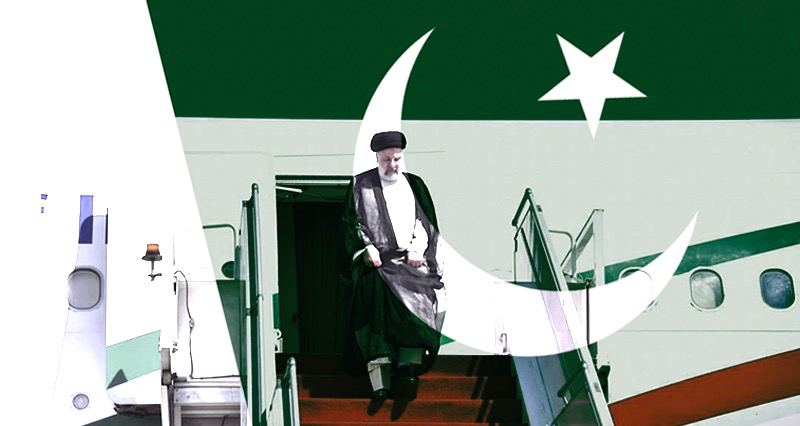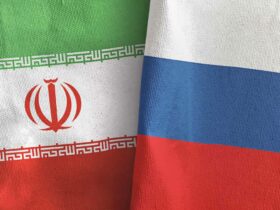By Dure Akram, Lahore, Pakistan
“In Friendship” between Pakistan and Iran, “We Trust”, billboards celebrated in Urdu and Persian dotting not just the federal capital Islamabad but also Lahore and Karachi this week, as Pakistan’s Prime Minister Shahbaz Sharif brought out an unexpected ace out of his foreign policy deck. There may not have been much to read into such romantic sloganeering, some would exclaim.
After all, key visits of foreign dignitaries in Pakistan are usually accompanied by public displays of such dipology. Similarly, prosaic has been government after government as it dabbles with plastering the faces of esteemed guests (an exercise, which, at times, is criticized as a little too in-the-face) in every nook of the country in a bid to send a strong message of solidarity. However, a lot did seem out-of-the-ordinary in the recent visit of Iranian President Ebrahim Raisi to his eastern neighbor.
As the first president to land in Pakistan in over eight years, that too, on the heels of tit-for-tat strikes early this year, Mr. Raisi was perhaps on a mission to smooth over frictions, especially when he faces growing pressures from all corners. Despite sharing a common border, people-to-people linkages, common religious ideology and a strong cultural framework that could form the basis of lasting collaborations, relations between the two South Asian countries have been rocky, to put it mildly.
In the past, no commercial agreements have been enough to bring the two together, largely because of Islamabad’s well-known affiliation with Saudi Arabia and the US, critical arch rivals of Iran. Add the UAE to the list of countries Pakistan has been making an active case for assistance to step out of its financial abyss, and the lingering uncertainty begins to make sense.
Going by claims of PM Sharif’s office, the two leaders signed as many as eight cooperation agreements amid pledges to increase the bilateral trade to an ambitious 10 billion dollars.
Repeated instances of interest in building on an “unacceptably” meager trade have yet to translate into something meaningful, despite the two countries establishing a border market in the province of Balochistan. Nevertheless, hope for the tide turning over remains slim because the most pressing of the contracts regarding the supply of Iranian gas hangs in the air. The high-profile yet extremely controversial gas supply deal, signed in 2010, sought to provide relief to Pakistan’s failing energy sector but languishes over political turmoil and international sanctions.
Even now, as Islamabad is forced to think of out-of-box solutions to complete its part of the bargain, driven by fears of Iranian wrath, the US Department of State cautions the Pakistani government to think twice before engaging in business deals with Iran.
As a consequence of the US slapping an array of sanctions on Tehran over its nuclear program, Washington’s spokesperson used a routine news briefing to convey its apprehensions on Tuesday; apparently, not even willing to wait for the Iranian President to head back home before it flexed muscles and gritted teeth. This apparent “word of caution” comes as an attempt to increase the cost of doing business with Iran, a country that perpetually remains on the radar over its foreign policy choices. The latest of these overt displays of military prowess came as unprecedented direct strikes on Israel.
Although Iran has been amongst the most vocal opponents since Israel’s war on Gaza began last October, the offensive has largely been a dance of cloak and shadows in the past. Surprisingly, this month, Iran decided to kick things up a notch, when over 300 of its drones and missiles lit up skies in the Middle East in an attack dubbed Operation True Promise. Critics maintain that the entire exercise spoke more to the optics than the intent to inflict actual damage. But while the ensuing silence from Israel and Iran adds to the claims, sanctions from the US and UK mean countries like Pakistan are about to enter a real dilemma.
Those with a finger on the real pulse believe that not much would come from this exaggerated meet and greet. Pakistan might have enjoyed its sixty seconds of fame where the international audience followed every press release, and every photo session with immense interest, waiting for the next turn in regional politics. Nevertheless, as Mr and Mrs President have returned to Tehran leaving Pakistan’s economic worries right where they were last week, there might not be many options available to its ruling elite.
Of course, in an ideal world, an obvious and simple response to Washington’s dictate stopping it from considering other partnerships could have been, “Can you help us with our economy?”
After all, Washington itself noted how Pakistan needed to “speak” to its foreign policy pursuits. Yet, in his last tenure as the country’s prime minister in 2022, the incumbent Shahbaz Sharif had drawn the ire of the opposition and social media with the mantra, “Beggars can’t be choosers,” when asked to explain his policies. This alone explains a lot about what is to happen on the South Asian stage in the coming weeks.

















Leave a Reply